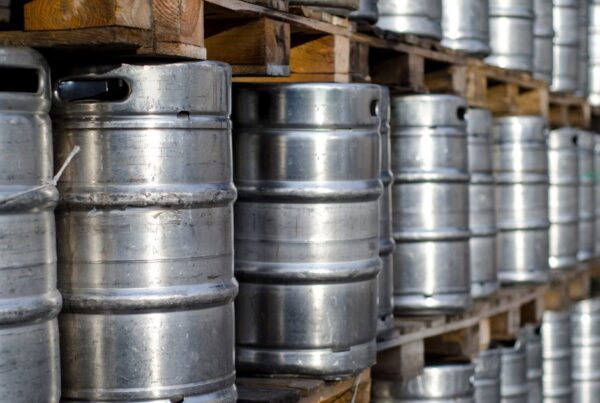The Magic of Organic Beer: Exploring Its Ingredients and Benefits
What Exactly Is Organic Beer?
Beer, one of the world’s oldest alcoholic beverages, has been a staple in human societies for millennia. But as the world becomes more health and environmentally conscious, so do our drinking habits.
Organic beer is one such trend that has been steadily growing in popularity over the years. Organic beer is made from ingredients that are free from synthetic fertilizers, pesticides, and other harmful chemicals.
This means that the grains, hops, yeast, malt and other ingredients used to make organic beer are grown without any artificial interventions or genetically modified organisms (GMOs). The brewing process itself also follows strict organic standards. Make sure to read out article where we break down what all of these beer terms mean.
Importance of Organic Ingredients
The use of organic ingredients in beer production brings several benefits both for consumers and the environment. First of all, organic farming practices help reduce overall pesticide use on crops while also promoting healthier soil quality.
This means that choosing organic ingredients not only supports sustainable agriculture but also helps preserve biodiversity by reducing chemical runoff into nearby ecosystems. But there are also benefits specifically related to beer taste and quality.
Organic grains tend to have a fuller flavor profile compared to their non-organic counterparts because they have not been stripped of their natural nutrients during processing. Similarly, using organic hops can lead to a more aromatic and complex flavor profile in the finished product.
All these factors combined make organic beer a great choice for those who appreciate high-quality beverages while still being mindful of health and sustainability concerns. In the following sections, we’ll explore each ingredient used in organic beer production in greater detail – from grains to yeast – so you can better understand what makes this drink so special!
The Buzz About Organic Grains
As one of the main ingredients in beer, grains play a crucial role in determining the flavor and overall quality of the final product. Organic grains, such as barley, wheat, and rye, are grown without the use of synthetic pesticides or fertilizers. Instead, they rely on natural methods to protect against pests and promote healthy growth.
This results in a higher quality grain that provides numerous benefits to beer production. Firstly, organic grains are often richer in nutrients compared to non-organic grains due to their lack of exposure to harmful chemicals.
This can lead to improved taste and aroma in the finished beer. Additionally, organic farming practices promote soil health by increasing biodiversity and reducing erosion.
As a result, organic grains can better withstand environmental stressors such as drought and flooding. When it comes to comparing organic and non-organic grains for brewing purposes, there are some notable differences.
Non-organic grains may be treated with chemical fertilizers that can lead to inconsistent growth patterns or lower-quality grain overall. In contrast, organic grain growers focus on promoting soil health which results in more consistent growth patterns over time.
Using organic grains has numerous benefits for both the environment and beer producers alike. From improved nutrient content to better soil management practices, it’s clear that these ingredients provide a superior option for brewing delicious beer that’s good for you and the planet!
The Role and Benefits of Organic Hops in Beer Production
Hops are one of the most important ingredients in beer production. They provide bitterness, aroma, and flavor to the final product. Organic hops are grown without synthetic pesticides or fertilizers.
These hops are becoming increasingly popular among breweries that want to produce high-quality organic beer. Organic hops have several benefits over non-organic hops.
First, they are free from synthetic chemicals that can harm the environment and potentially affect the taste of the beer. Organic farming also promotes soil health and biodiversity, which can lead to healthier hop plants that produce a more robust flavor profile.
Another benefit of using organic hops is the reduction of chemical residues in the final product. Non-organic hop farmers often use pesticides and fertilizers that can leave harmful residues on the plant material.
These chemicals can then make their way into your beer if non-organic hops are used in production. When comparing organic to non-organic hops, there are noticeable differences in flavor and aroma.
Organic hops tend to have more complex flavors with a wider range of aromas than their non-organic counterparts. This is due to the fact that organic farming practices encourage diverse microbial populations in soil which results in diversity among crops produced from such farms.
Using organic hops in beer production has many benefits for both producers and consumers alike. This ingredient not only provides unique flavors but also promotes sustainable agriculture while maintaining healthy soil balance by avoiding reliance on synthetic chemicals found with non-organic hop farming practices.
The Importance of Yeast in Brewing
Yeast is an essential ingredient in the brewing process. It is a type of fungus that converts sugars into alcohol and carbon dioxide, which gives beer its characteristic flavor and carbonation. Yeast also plays a crucial role in determining the final taste and quality of beer.
During the fermentation process, yeast consumes the sugars present in wort (a liquid made from malted grains and water) and produces alcohol as a byproduct. The type of yeast used can impact the final flavor profile of the beer, as different yeasts produce different flavors and aromas.
Organic vs Non-organic Yeast
Just like with grains and hops, some brewers choose to use organic yeast for their beer production. Organic yeast is grown without synthetic pesticides or fertilizers, making it a more natural option for those concerned with environmental sustainability or personal health. However, organic yeast can be harder to find than non-organic alternatives.
Non-organic yeasts are often treated with chemicals to ensure their purity and consistency. While these treatments may not directly affect the final product’s taste or quality, some brewers prefer to use organic ingredients throughout their entire brewing process for philosophical reasons.
The Impact on Taste and Quality
The type of yeast used can have a significant impact on the taste and quality of beer. Some strains produce fruity or spicy flavors that complement certain styles of beer, while others produce more neutral profiles that allow other ingredients (like hops) to shine through.
While using organic yeast may not guarantee a superior tasting beer compared to non-organic alternatives, it is still an important consideration for brewers who prioritize sustainable practices or want to avoid synthetic chemicals in their products. Ultimately, choosing between organic or non-organic yeast will depend on individual preferences and priorities as a brewer.
The Importance of Water Quality in Organic Beer Production
Water is one of the most important ingredients in beer, accounting for up to 90% of the finished product. As such, it’s essential to use high-quality water when brewing organic beer. Water quality can affect not only the taste and aroma of the final product but also its appearance and drinkability.
Inorganic compounds such as chlorine and fluoride can have a negative impact on beer flavor. Chlorine, for example, can cause off-flavors that resemble plastic or medicinal flavors.
Fluoride, on the other hand, can result in astringency and bitterness. These compounds are often present in tap water, so many brewers choose to use purified or filtered water instead.
Use of Filtered or Purified Water in Organic Beer Production
Filtered or purified water is often preferred by organic brewers because it is free from chemicals and other contaminants that may negatively affect the final product’s taste and quality. Additionally, using filtered or purified water ensures consistency from batch to batch. There are several ways to filter or purify water for use in beer production.
One option is reverse osmosis filtration, which removes impurities by forcing water through a semipermeable membrane under high pressure. Another option is activated carbon filtration, which uses carbon granules to absorb impurities like chlorine and pesticides.
Some brewers also choose to use distilled water in their recipes since it has had all minerals removed during the purification process. This approach has its advantages as it allows for absolute control over the mineral content of the brewing liquor.
The downside is that some minerals are necessary for beer flavor development. Ultimately, whether you choose reverse osmosis filtration, activated carbon filtration or distilled water will depend on your personal preferences as well as your recipe requirements; however using clean filtered/purified/distilled should be considered mandatory regardless of what technique you employ when brewing your organic beer.
Other Ingredients
Fruit and Spices in Organic Beer?
While grains, hops, water, and yeast are the core ingredients of beer, many brewers like to get creative by adding additional ingredients like fruit and spices. These can add unique flavors and aromas to the beer that you won’t find in a traditional brew. But what’s the deal with using organic versions of these ingredients?
First of all, let’s talk about why brewers might choose to use fruit or spices in their beer. For one thing, it can make for a more interesting drink – who wouldn’t want to try a cherry-infused ale or a cinnamon-spiced porter?
Additionally, these ingredients can provide some nutritional value: for example, many fruits are high in antioxidants. Now, when it comes to organic brewing practices specifically, there are some good reasons for using organic fruit and spices.
Conventionally grown produce is often treated with pesticides or herbicides that can harm both the environment and human health – not exactly a desirable addition to your pint glass! By choosing organic versions of these ingredients instead, you’re supporting more sustainable farming practices while also avoiding exposure to harmful chemicals.
The Importance of Using Organic Versions
That being said, just because something is labeled as “organic” doesn’t necessarily mean it’s automatically better than its non-organic counterpart. You’ll still want to look for high-quality ingredients that are fresh and flavorful. When it comes to fruit specifically, there are some additional considerations.
Depending on how they’re prepared (e.g. dried vs fresh), certain fruits may contain more or less sugar – which can impact the fermentation process and potentially affect the final flavor of your beer. Additionally, different fruits will pair better with certain types of beer than others; for example, tart berries might work well with a sour ale while sweeter fruits might be better suited for a wheat beer.
As for spices, be aware that some can be overpowering if used in excess – so it’s important to use them sparingly and experiment with different combinations to find what works best. And of course, if you’re considering adding additional ingredients to your beer, keep in mind that this will impact your brewing process: you’ll need to adjust your recipe accordingly and factor in the added time and effort involved.
Certification and Labeling
Overview of certification process for organic beers
Organic beer is certified by the United States Department of Agriculture (USDA) as per the National Organic Program (NOP). The NOP has a strict set of guidelines that dictate how organic ingredients are grown, harvested, processed, and handled. This certification process ensures that only beers made with at least 95% organic ingredients are labeled as “organic.”
To achieve certification, beer manufacturers must go through an application process that includes providing documentation on the source of all their ingredients. They must also submit a detailed description of their brewing process, which includes information about the equipment they use and how they ensure that no non-organic materials come into contact with the beer during production or storage.
Once the USDA approves their application, breweries are subject to annual inspections to ensure that they are following all NOP guidelines. The inspections include both a review of records and an on-site visit to assess compliance.
Requirements for labeling as “organic”
The USDA has strict guidelines governing what words can be used on beer labels. Only beers made with at least 95% organic ingredients can be labeled as “organic.” Additionally, these beers must display the USDA Organic logo on their packaging. Beers containing between 70% and 95% organic ingredients can only use the term “made with organic ingredients” on their label.
It’s important to note that while many breweries may claim to use organic ingredients in their recipes, they cannot legally label their beer as “organic” without going through the certification process outlined by the USDA’s NOP. If your favorite craft brewery does not have an official USDA Organic seal on its bottles or cans, chances are its products aren’t certified.
If you’re looking for a healthier and more eco-friendly alternative to traditional beer production methods, then it’s worth seeking out organic beer. However, be sure to look for the USDA Organic logo on your beer bottle or can to ensure that you’re getting the real deal.
Conclusion
Organic Beer – An Investment in Your Health and the Planet’s
Organic beer may cost a little more, but it’s an investment in your health and the planet’s. By using organic ingredients, you’re reducing your exposure to pesticides, herbicides, and other harmful chemicals. The organic farming practices used to grow the ingredients also help to protect the environment by reducing pollution and soil erosion.
The Taste of Organic Beer – It’s Worth It
Using organic ingredients can also improve the taste of beer. Organic grains and hops are often fresher because they haven’t been treated with preservatives or stored for long periods of time.
This can result in a richer, fuller flavor that’s more true to the natural taste of the ingredients. Organic yeast can also add complexity to the flavor profile.
Certification – A Guarantee of Quality
Certification is another important aspect of organic beer production. Look for beers that carry a certification label such as USDA Organic or Oregon Tilth Certified Organic.
These labels indicate that strict standards have been met throughout all stages of production, from growing the grains and hops to brewing the final product. Certification provides consumers with a guarantee that they’re getting a high-quality product made from truly organic ingredients.
Choosing organic beer is not just about enjoying a delicious beverage – it’s about supporting responsible farming practices, protecting your health and our environment, and ensuring quality in every sip. So next time you’re browsing through your local liquor store or craft brewery, consider selecting an organic option – your taste buds (and Mother Nature) will thank you!






